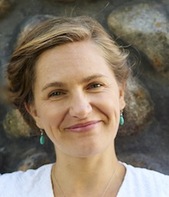On February 10, the Frontline special ‘Being Mortal’ aired on PBS. ‘Being Mortal’ is based on the book that’s gotten attention lately regarding end-of-life health care. While reflecting on my 5 years working in hospice care, I wanted to debunk common misconceptions and share some info (my own words and thoughts and experiences, not those of any organization).
For a limited time, you can watch ‘Being Mortal’ online.
Sarah Newberry Donovan, MA, MT-BC, has worked as a board-certified music therapist in hospice care for 5 years and is currently pursuing her mental health counseling license in Minnesota. Her favorite part of her work is seeing the positive difference that can be made in someone's life by the conscious and caring presence of another person, and that it's not always the patient receiving the benefit. Her brother also happens to be Chris Newberry, Director-Producer of American Heart.
- Hospice is not a place, it’s a philosophy of care keeping someone comfortable rather than working to cure them. There are hospice homes that are lovely places, but most hospice care is done wherever people live.
- The patient and family always decide when it is time to switch to comfort care rather than seek aggressive treatment. Death panels are not a real thing. Patients can opt out of hospice at any time and re-enroll at any time.
- Hospice services do not provide 24/7 care. Ideally on hospice, you or your loved one is comfortable and symptoms managed and do not need medical care 24/7.
- Hospice is a holistic view of health, our care team consists of a nurse, social worker, chaplain, physician, pharmacist, massage therapist, music therapist, grief counselor & volunteers.
- Hospice care is not only for those very last days, one can go on hospice when their doctor thinks they have 6 months or less to live. Plenty of people outlive their prognosis and receive hospice care for many months and sometimes years. Some people only for a few days, and their family usually wishes they had chosen that path sooner.
- Most hospice care is paid for my Medicare and sometimes by private insurance.
- There are many organizations that provide hospice care, for profit and non-profit. You can interview several of them and choose the one that you like best or fits you best. You do not have to receive hospice care from the organization affiliated with your doctor, hospital or nursing home.
- Pain medications are often used, but in doses commonly used for hospice comfort they do not end life, the terminal illness does. Pain is a prominent symptom very bothersome to many people that can usually be well controlled with medication. It does seem that sometimes once someone is comfortable and pain free they ‘let go’ and pass away. However, patients and families have the right to accept or refuse any medication they wish. The patient’s comfort may suffer by rejecting certain medications, but it is always a choice.
- By not giving someone food or water at the very end of life, you are not killing them. You are allowing the natural process of dying to happen, the digestive system is shutting down. Obviously if someone wants and can tolerate drinking and eating, then that is an important part of their care and quality of life that needs to be supported.
- There are many people who are alone and unsupported in their dying process. The image of a person surrounded by a wealth of loving family sending them off with words of love and gratitude is more rare than it ought to be. In hospice, we don’t judge. Life is life, and family stuff is hard. We support the patient and family as best we can and validate and honor the family history that got them to where they are. There can be amazing strife and amazing healing at the end, sometimes both.
- Hospice workers, we love what we do. It’s sometimes sad, but usually it’s really beautiful to be there for people in a trying time and to help make things better. I often feel a sense of release and peace when one of my patients dies, because they were ready and they were comfortable. And because we helped them come to that readiness and comfort.
For a limited time, you can watch ‘Being Mortal’ online.
Sarah Newberry Donovan, MA, MT-BC, has worked as a board-certified music therapist in hospice care for 5 years and is currently pursuing her mental health counseling license in Minnesota. Her favorite part of her work is seeing the positive difference that can be made in someone's life by the conscious and caring presence of another person, and that it's not always the patient receiving the benefit. Her brother also happens to be Chris Newberry, Director-Producer of American Heart.
 RSS Feed
RSS Feed
